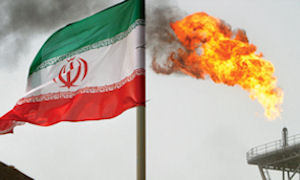 The European Union has stepped up pressure on Iran by imposing a ban on oil imports from the Islamic republic until it complies its international demands over its nuclear program. The 27 EU member countries also agreed to freeze assets in an effort to starve the nuclear program of funding. Iran had "failed to restore international confidence in the exclusively peaceful nature of its nuclear program", British Prime Minister David Cameron, French President Nicolas Sarkozy and German Chancellor Angela Merkel said in a joint statement, adding: "We will not accept Iran acquiring a nuclear weapon. Iran has so far had no regard for its international obligations and is already exporting and threatening violence around its region."
The European Union has stepped up pressure on Iran by imposing a ban on oil imports from the Islamic republic until it complies its international demands over its nuclear program. The 27 EU member countries also agreed to freeze assets in an effort to starve the nuclear program of funding. Iran had "failed to restore international confidence in the exclusively peaceful nature of its nuclear program", British Prime Minister David Cameron, French President Nicolas Sarkozy and German Chancellor Angela Merkel said in a joint statement, adding: "We will not accept Iran acquiring a nuclear weapon. Iran has so far had no regard for its international obligations and is already exporting and threatening violence around its region."
The sanctions freeze the assets of Iran's central bank in European Union nations and ban the importation of Iranian oil to those countries. The measures also block EU countries from exporting petrochemical equipment and technology to Iran, or trading diamonds and precious metals with the Middle Eastern state. "Iran has it in its power to end sanctions by changing course and addressing the concerns of the international community," British Foreign Secretary William Hague said.
Iran exports around 2.2. million barrels of crude oil a day, about a fifth of which is bound for Europe. The world consumes about 89 million barrels of oil per day. The European Union said it would allow contracts that are already in place to be fulfilled until 1 July 2012. Saudi Arabia’s Oil Minister Ali al-Naimi told CNN that his country could make up the difference if Iran was banned from exporting oil.
Israel’s Defense Minister Ehud Barak called the EU move "highly important," saying it set "a new standard for the sanctions like never before." The Obama administration also welcomed the decision. The US government took its own punitive action against Iran on Monday with the US Treasury targeting the state-owned Iranian bank Tejarat for allegedly working with other Iranian banks and firms subject to sanctions tied to the nuclear program.
Tehran angrily rejected the oil embargo and called it "unfair" and "doomed to fail". The measures would not prevent Iran's "progress for achieving its basic rights", Foreign Ministry spokesman Ramin Mehmanparast said.
Meanwhile, the International Atomic Energy Agency confirmed it will send a team to Iran between 29 and 31 January "to resolve all outstanding substantive issues". Last November, an IAEA report found that Iran had carried out tests "relevant to the development of a nuclear explosive device".








